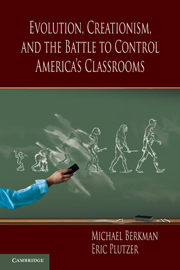Book contents
- Frontmatter
- Contents
- Figures
- Tables
- Acknowledgments
- Introduction
- 1 Who Should Decide What Children Are Taught?
- 2 The Public Speaks: “Teach Both”
- 3 A Nation Divided by Religion, Education, and Place
- 4 Is Evolution Fit for Polite Company? Science Standards in the American States
- 5 Teachers and What They Teach
- 6 State Standards Meet Street-Level Bureaucracy
- 7 When the Personal Becomes Pedagogical
- 8 Teachers in Their Schools and Communities
- 9 The Battle for America’s Classrooms
- Appendix to Chapter 2
- Appendix to Chapter 3
- Appendix to Chapter 4
- Appendix to Chapter 5
- Appendix to Chapter 6
- References
- Judicial Opinions and Court Cases Cited
- Index
9 - The Battle for America’s Classrooms
Published online by Cambridge University Press: 05 June 2012
- Frontmatter
- Contents
- Figures
- Tables
- Acknowledgments
- Introduction
- 1 Who Should Decide What Children Are Taught?
- 2 The Public Speaks: “Teach Both”
- 3 A Nation Divided by Religion, Education, and Place
- 4 Is Evolution Fit for Polite Company? Science Standards in the American States
- 5 Teachers and What They Teach
- 6 State Standards Meet Street-Level Bureaucracy
- 7 When the Personal Becomes Pedagogical
- 8 Teachers in Their Schools and Communities
- 9 The Battle for America’s Classrooms
- Appendix to Chapter 2
- Appendix to Chapter 3
- Appendix to Chapter 4
- Appendix to Chapter 5
- Appendix to Chapter 6
- References
- Judicial Opinions and Court Cases Cited
- Index
Summary
Maybe down the road, when science can answer all questions (which in my opinion will never happen), the “Intelligent Designer” hypothesis will be put to rest and all religious institutions will crumble out of existence.
Florida Teacher (2007)Every modern discussion of man's future, the population explosion, the struggle for existence, the purpose of man and the universe, and man's place in nature rests on Darwin.
Biologist Ernst Mayr in the preface to Darwin's Origin of the Species (1974)Well did God make man in a breath of holy fire
Or did he crawl on up out of the muck and mire
Bruce Springsteen, Part Man, Part Monkey (1998)
The evolution–creation wars of the past ninety years are a familiar feature of the political landscape. So familiar that it is easy to think of this conflict as both normal and inevitable. But even the most cursory examination of other nations shows that this political conflict is distinctly American. Its emergence in the 1920s as a salient culture war was a result of the fragmentation of American Protestantism, the professionalization of science, and the rapid expansion of public education.
The evolution–creation war of the 1920s remains with us today – changed in some ways but remarkably similar in others. The continuity is a result of several factors. Of great importance is the fact that the earliest political opposition to evolution was transformed into a social movement. Sustained by its own anti-evolution associations and by religious organizations, anti-evolutionism became institutionalized. Over many decades, the movement retained the resources to support speaking tours by its most charismatic orators, built large membership bases that provided financial contributions, and disseminated its ideas via pamphlets, books, broadcasts, internet sites, and research institutes. Associated with specific faith traditions, anti-evolutionism has also been sustained by support from an array of churches and seminaries. Simultaneously, the professionalization and growth of science provided an institutional home for proponents of evolution. Today's scientific organizations have large bureaucracies, public relations offices, and a lobbying presence in the halls of power.
- Type
- Chapter
- Information
- Publisher: Cambridge University PressPrint publication year: 2010
- 1
- Cited by



